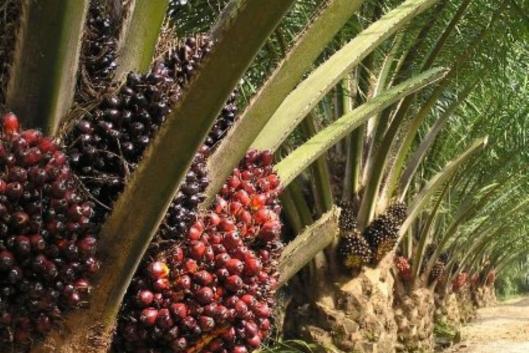In late 2013, a group of representatives of African, Indonesian and international NGOs met with members of La Via Campesina and the African Biodiversity Network in Calabar, Nigeria, to address the massive expansion of industrial oil palm plantations on the African continent and discuss, in particular, the situation in Nigeria, Sierra Leone, Liberia, Cameroon, Benin, Côte d’Ivoire, the Democratic Republic of Congo and Gabon.
The oil palm is native to west and central Africa, but it is not common for local communities to establish large-scale monoculture plantations of these trees. Normally, oil palms are planted alongside other crops, guaranteeing diversity that contributes to the food sovereignty of the community and the protection of the environment. Cultivated in this way, and under community control, oil palm has provided a range of benefits for African people in more than 20 countries. It is particularly noteworthy that in almost all of these countries, it is women who control the entire oil palm production chain, from cultivation to the sale of the various products derived from the tree.
Over the last 10 years or so, African governments have granted land concessions totalling millions of hectares to big palm oil companies and investors from Europe, the United States, and also Indonesia, India, Singapore and Malaysia. As a result, another model of production has been introduced on lands that traditionally belonged to peasant farmer communities: the large-scale monoculture plantation model, under the control of transnational corporations and with few or no benefits for local communities. This process forms part of the ongoing land grab by foreign investors to ensure the production of food and other products for export.
At the meeting in Nigeria, emphasis was placed on the similarities between the different countries, beginning with the fact that local communities are not consulted to determine whether or not they want oil palm plantations in their territories. This represents a total lack of respect for the communities who have traditionally controlled and used these lands for many generations. Governments prefer to side with the transnationals, pointing to the alleged importance of “foreign direct investment”. It is extremely difficult for communities and the organizations that support them to obtain information on the contracts signed for the concession of these lands to the transnationals. The result is the destruction of forests, scarce and poorly paid employment, poverty and hunger – quite the opposite of the publicity spread by the corporations and backed by governments and international financial institutions praising the “progress” and “development” that this model will supposedly generate. The consequence of this “progress” is the transformation of these countries into suppliers of raw materials and semi-finished products for the large consumer markets, under the control of the transnationals.
The participants in the meeting in Calabar observed that they must contend with numerous challenges, including the fact that the peasant communities where the industrial oil palm plantations arrive already face many difficulties in their daily lives – a fact that in some way facilitates the entry of the companies. In addition, the companies seek to convince community leaders with various promises that are not kept. The resulting disillusionment, combined with all of the problems resulting from the loss of the land, often lead to divisions within the community. Women, who play such an important role in traditional oil palm cultivation, are hit especially hard by the impacts. All of this points to the enormous need to support these communities who must join together (the leaders and the community members, including women and youth) and organize to fight back, as a united front, against this ongoing process of the theft of their lands.
The meeting participants also stressed the importance of learning about the experience of other places, particularly those who have been facing this problem for a longer time, such as Indonesia. This edition of the bulletin has been prepared in this same spirit, as it aims to serve as an information tool to support the struggles of communities on various continents and to help them join together to create a more powerful force against the expansion of oil palm plantations. This is especially relevant in the month of April, given that April 17 is the International Day of Peasant Struggle.
Numerous participants also highlighted another need: if an organization in one country is facing repression, the others must lend their support. We hear many stories of repression and criminalization of opposition, and mutual solidarity is crucial. Moreover, it is not enough to talk about the problem; it is essential to take action and support communities in their struggles to defend their territories. When communities have control over their territories and receive support for their local economic activities and proposals, this is a much more promising road to ensure the future of these communities than the model of monoculture plantations and land grabbing that benefits only the transnationals.
The meeting ended with the signing of a declaration of support for communities affected by the expansion of oil palm plantations in Africa: the Calabar Declaration. (2)
(1). For more information on the expansion of industrial oil palm plantations in Africa, including an interactive map, see here.
(2) The Calabar Declaration.
